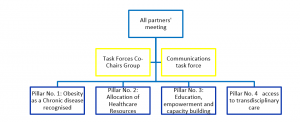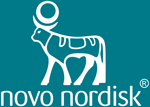Building on the cooperation that led to the drafting of the EU Obesity Policy Engagement Network Call To Action: Changing The Status Quo In Obesity, the undersigned organisations have agreed to collaborate on realising the objectives under four pillars of the Call to Action (refer to page Annex 1, page 5, for details) to the best of their capabilities and organisational capacities.
This document sets out basic Rules of Engagement as well as Governance Structures to which all agree to adhere for the duration of the collaboration.
The operational language of the Coalition is English.
OPEN-EU is formed as an EU level Coalition for organisations with a transborder reach to promote a shared vision for stemming the tide of obesity in Europe, based on jointly developed recommendations.
The aim of the OPEN-EU group will be to work together to implement a cross-cutting policy approach at EU level. A focus will be to ensure EU Member States and respective regions are empowered and able to provide people living with obesity access to fair, effective obesity treatment and management.
An integral element of the collaboration will be to raise a new narrative on obesity high on the political agenda across all policies – not only conventional health or food related policies – in order to bring the necessary changes to address the unprecedented challenges and opportunities driven by an ageing population and increased prevalence of chronic diseases that healthcare systems and citizens across Europe are facing.
The objectives of the Coalition are:
Any activities, in addition to the agreed annual work programme, need to be presented to and agreed by all partners.
Every European level organisation from civil society, institutional and private sector, whose main mission and objectives actively contribute to OPEN-EU ambitions and are ready to commit to its stated objectives and recommendations, can join the partnership.
Additional requirements are as follows:
Requests to join the Coalition must be addressed in writing to at least one of the Coalition’s partners. All Coalition partners will have to approve it unanimously in writing (email or otherwise).
6. Withdrawal and Exclusions
Any partner may give notice of its withdrawal to the Coalition in writing. Withdrawal shall take effect two weeks after its receipt by at least one of the Coalition’s partners. In the event of a breach of these Terms of Reference, the Coalition, having consulted the partner concerned, can exclude such a partner by a 75% vote of all partners.
All Coalition partners meet regularly either in person or via call, and at least twice a year, to discuss the status of current initiatives and approve the future strategy. More than one representative per organisation can participate in these meetings. However, every partner organisation has only the right to one vote. Decisions are taken by consensus, unless otherwise specified. These meetings are convened by volunteering partners.
The Coalition is also composed of four policy groups and a communication task force. The communication task force takes care of internal and external communication. The policy groups propose priority topics to all partners in line with their respective pillars of focus.
Partners can propose to focus on additional topics and/or substitute some of the existing ones. Decisions will be taken unanimously by all partners. Partners can also raise additional issues for discussion in the Coalition, for example relating to a current topic on the Brussels policy agenda. Partners will decide by unanimity if the Coalition should develop a joint view on the topic and if necessary set up a temporary working group to work on the issue.
Every group can be co-chaired by up to two partners, who set up meetings and/or teleconferences, define the agenda and steer the discussions. Every partner organisation can put forward its application for co-chairmanship at the beginning of the year. Elections will take place during the first meeting of the group; the co-chairs are voted by simple majority of the groups’ members. In case of a tie vote, a second round will be organised when only top three candidates contest.
The list of partners active in each group can be found in Annex I, while Annex II defines the organigram of the Coalition. Membership in the groups is revisited at the beginning of every year, but partners can, at any time and in writing, show their interest in joining another group, and they will be automatically be admitted.
A. Rights
Each partner has the right to:
B. Obligations
Each partner has the obligation to:
In cash contributions will be agreed by the interested partners. Other partners, unless they request otherwise in writing, contribute in-kind. The list of in cash and in-kind contributors can be found in Annex III. In cash contributions will be made transparent and be published in the Coalition’s website.
Banking arrangements, and the accounting process, will be agreed unanimously between the partners.
The budgetary/accounting year will cover the period from January to December. In the event that there is a leftover balance at the end of the mandate of the Coalition, the remaining amount will be divided and redistributed between the partners, in proportion to their budgetary contribution.
Both in case of withdrawal or exclusion in the course of the financial year, the contribution for the current year, if applicable, will be due.
All Partners agree to bear their own travel costs.
These Terms of Reference do not grant any authority for any individual partner to legally bind any other partner, or partners, or the Coalition.
Annex II
Annex II defines the organigram of the Coalition.

OPEN EU All Partners Meeting – role and remit
The OPEN EU All Partners Meeting includes a representative from each of the OPEN EU partner organisations. The role of the OPEN EU All Partners Meeting, OPEN EU’s highest decision-making body, is to:
Task Force Co-Chairs will:







